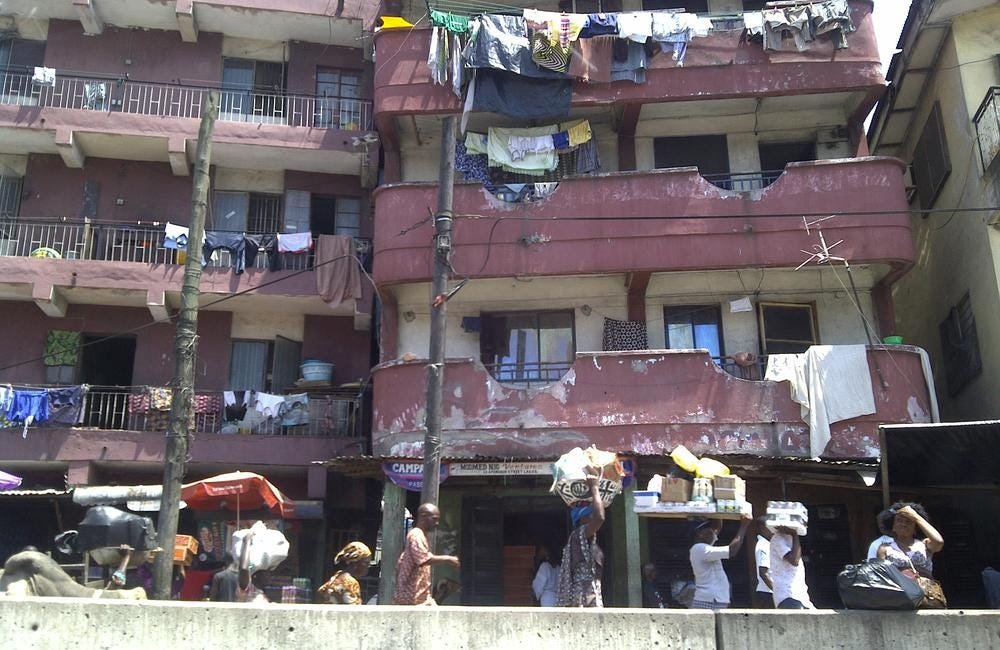The proverb that a man is bathing in a river yet having soap in his eyes can’t be truer than in the case of the Nigerian housing challenge. This challenge has remained intractable in spite of the various conscious efforts made by successive Nigerian governments to rein in the monster of homelessness that has plagued the Nation.
Housing is a very critical issue in Nigeria which should command instant attention. Nigeria, a country of over 170 million people, with a huge percentage in the slums, while others are totally homeless, has obviously remained helpless in dealing with the problem
Walking through the streets of Lagos, Abuja, Port Harcourt, Aba and so forth, one is confronted with the eye sore of sham buildings, squatter settlements and other kinds of uninhabitable places, indicative of the fact that either there is no government or that the government is not concerned with the welfare of the citizens.
Nigeria’s housing deficit is a problem the various governments over time have tried to solve with various strategies. Several deft moves by the governments over time have proved unproductive. As far back as 1956, efforts had been made to tackle the housing problem by the setting up of the Federal Mortgage Bank of Nigeria.
The Federal Mortgage Bank of Nigeria is Nigeria’s major mortgage financial institution, saddled with the responsibility to provide funding for agencies and individuals to bridge the housing gap. Among its major mandates are to link the capital market to the housing industry in order to operate a viable housing sector, with view to making primary and secondary Mortgage institutions deliver service to every section of the country and management and administration of the contributory savings scheme known as the National Housing Fund (NHF) established by Act 3 of [1992].
The National Housing Fund (NHF) is a social savings scheme designed to mobilize long-term funds from Nigerian workers, banks, insurance companies and the Federal Government to advance concessionary loans to contributors. This means that there is a whole lot of money at the disposal of the Federal Mortgage Bank of Nigeria.
A lot of Nigerians are still homeless after many years of mortgage finance collected by the Federal Mortgage Bank. The rising cost of housing in Nigeria calls for serious concern. That has caused citizens to beam searchlights on the activities of the major mortgage financing institution and it was allegedly discovered that the bank has been diverting the huge funds collected yearly into other ventures. As economists would say, this has led to critical opportunity costs for the entire nation and especially the low income and no income earners. Such diversions have strangulated the housing sector and are stifling industrialization because a man needs a place to call home before thinking of starting a business.
Allegations are rife that the funds are diverted to cronies and friends of the leadership of the banks. Funds are allegedly disbursed without recourse to due process and objective. It could be noted, from the above, that the functions of the bank are strictly limited to providing affordable housing through working with other financial institutions to make funds available to those who want to go into the business of housing and allied ventures.
There is also the allegation of the reign of tribalism in the bank. Professionalism and ethics are by passed in favour of tribesmen and associates of the Chief Executive of the Institution. Recruitment and even promotion has remained a privilege of a select few who go on leave, sponsored trips abroad and other privileges at will. It is obvious to even the first timer to the building that a particular section of the country has unrestrained access to funds and privileges at the institution. With such a huge diversion of attention, the consequences are that the country is suffering at the hands of the unprofessional team manning the critical and one of the most important financial institutions in Nigeria.
Efforts made by our reporter the federal government and the Economic and Financial Crimes Commission would do well to beam their search light on the institution to enable it deliver on its mandate and to save it from the hands of those who have turned it into their conduit pipe by which self-enrichment is facilitated. This would save our bourgeoning population and our nation from impending implosion.



